Liver Cancer Protein Intake Calculator
This tool helps liver cancer patients estimate their daily protein needs based on body weight and treatment status. The recommended intake is between 1.2-1.5 grams per kilogram of body weight.
Facing a liver cancer diagnosis can feel like stepping into a maze of medical terms, treatment options, and endless advice. One of the most immediate questions many patients ask is: liver cancer diet-what should I actually put on my plate? The answer isn’t a one‑size‑fits‑all diet plan, but a set of evidence‑backed food choices that can help preserve liver function, reduce inflammation, and support overall wellbeing during treatment.
Quick Takeaways
- Focus on high‑quality protein, fiber‑rich whole grains, and colorful vegetables.
- Boost intake of antioxidants and omega‑3 fatty acids.
- Avoid processed meats, added sugars, excessive salt, and alcohol.
- Stay hydrated and space meals throughout the day.
- Work with a dietitian to tailor portions to your treatment schedule.
Why Nutrition Matters in Liver Cancer
Liver Cancer is a malignant growth that originates in the liver’s cells, commonly linked to chronic hepatitis, cirrhosis, or long‑term alcohol use. The liver’s primary jobs-filtering toxins, producing proteins, and managing energy stores-can be compromised by both the disease and aggressive treatments like chemotherapy or radiation.
When the organ is under stress, it needs nutrients that protect cells, reduce oxidative damage, and aid regeneration. Studies from the International Journal of Hepatology (2023) show that patients who maintain a diet rich in antioxidants have better tolerance to chemotherapy and experience fewer complications.
Foods That Support Liver Health
Below are the food groups that consistently show benefits for liver function and can be safely incorporated into most treatment plans.
- Leafy Greens - Spinach, kale, and Swiss chard are packed with chlorophyll and vitamins A, C, and K. These nutrients help neutralize toxins.
- Cruciferous Vegetables - Cruciferous vegetables like broccoli, cauliflower, and Brussels sprouts contain glucosinolates, compounds that boost the body’s detox enzymes.
- High‑Quality Protein - Lean poultry, fish, eggs, and legumes supply essential amino acids for tissue repair without overloading the liver.
- Omega‑3 Fatty Acids - Fatty fish (salmon, sardines), chia seeds, and walnuts deliver omega‑3 fatty acids, known to reduce inflammation and improve liver fat metabolism.
- Whole Grains - Oats, quinoa, brown rice, and barley provide fiber that stabilizes blood sugar and eases the liver’s workload.
- Fruits Rich in Antioxidants - Berries, citrus, and pomegranate offer vitamin C, flavonoids, and polyphenols that protect liver cells from oxidative stress.
- Legumes & Beans - Lentils, chickpeas, and black beans are plant‑based protein sources that also add soluble fiber.
- Low‑Sodium Herbs & Spices - Turmeric, ginger, garlic, and rosemary have anti‑inflammatory properties and enhance flavor without extra salt.
Foods to Limit or Avoid
While it’s tempting to think “just eat healthy,” certain foods can actively worsen liver inflammation or interfere with treatment.
- Processed Meats - Processed meats such as sausages, bacon, and deli slices contain nitrites and high sodium that strain liver detox pathways.
- Added Sugars - Sodas, candies, pastries, and sweetened sauces contribute to fatty liver buildup and can spike insulin, which isn’t ideal during chemotherapy.
- Alcohol - Even low amounts can accelerate liver damage. Complete abstinence is usually recommended for anyone with liver cancer.
- Trans Fats - Fried foods, margarine, and many packaged snacks increase inflammation and hamper liver cell recovery.
- High‑Sodium Foods - Canned soups, salty snacks, and certain sauces can cause fluid retention, worsening ascites (fluid buildup in the abdomen) common in advanced liver disease.
- Red Meat in Excess - While occasional lean beef is fine, large portions of red meat can increase oxidative stress.
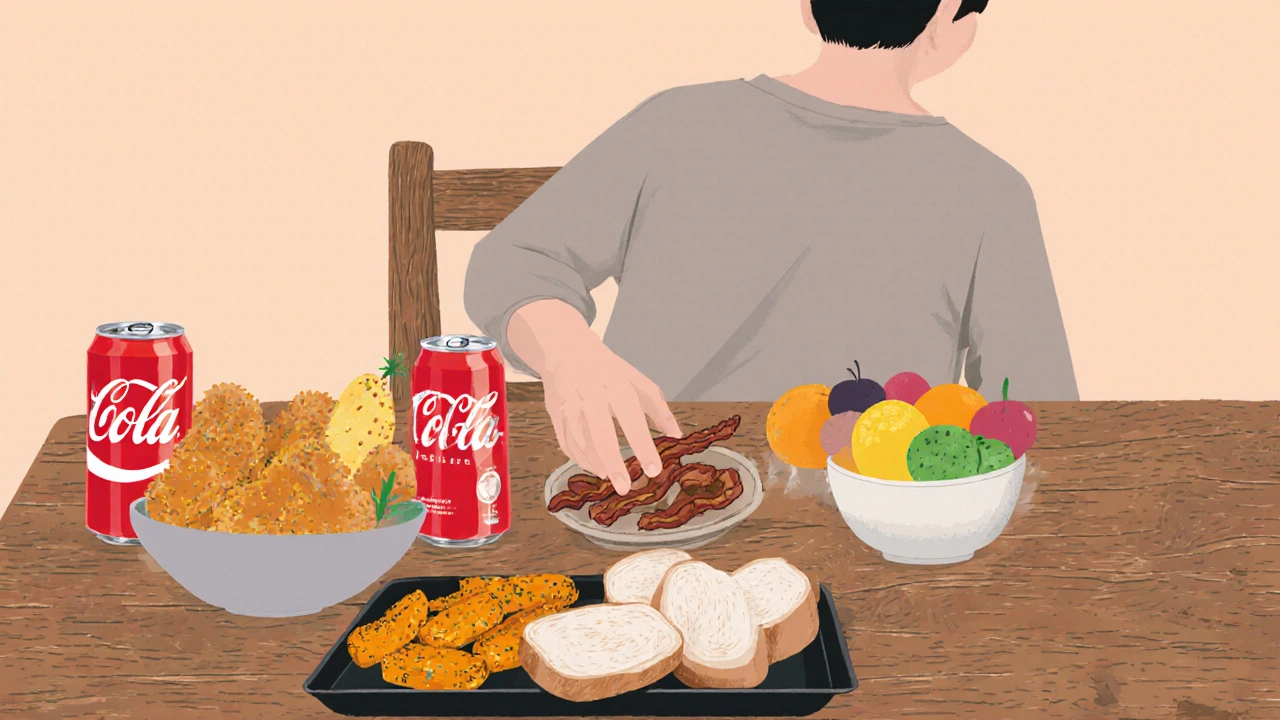
Sample One‑Day Meal Plan
- Breakfast: Oatmeal topped with blueberries, a tablespoon of ground flaxseed, and a splash of low‑fat milk.
- Mid‑Morning Snack: A small apple with a handful of almonds.
- Lunch: Grilled salmon (150g) over a quinoa salad mixed with spinach, cherry tomatoes, cucumber, and a drizzle of olive‑oil‑lemon dressing.
- Afternoon Snack: Carrot sticks with hummus.
- Dinner: Stir‑fried tofu with broccoli, bell peppers, and ginger; served with brown rice.
- Evening Snack (if needed): A cup of plain Greek yogurt with a sprinkle of cinnamon.
Adjust portion sizes based on your energy needs and any appetite changes caused by treatment.
Practical Tips for Sticking to a Liver‑Friendly Diet
- Plan Ahead: Batch‑cook grains and proteins on weekends, then mix‑and‑match with fresh veggies during the week.
- Read Labels: Look for hidden sugars (e.g., high‑fructose corn syrup) and sodium listed per serving.
- Hydrate Smartly: Aim for 1.5-2L of water daily; herbal teas like dandelion or peppermint are gentle alternatives.
- Flavor Without Salt: Use citrus zest, herbs, and low‑sodium sauces to keep meals tasty.
- Consult a Dietitian: A professional can personalize macro‑nutrient ratios, especially if you’re dealing with weight loss or malnutrition.
- Track Symptoms: Keep a food‑symptom diary to spot any foods that trigger nausea or digestive upset.
Eat vs. Avoid: Quick Comparison Table
| Eat | Avoid |
|---|---|
| Leafy greens (spinach, kale) | Processed meats (bacon, sausages) |
| Fatty fish (salmon, sardines) | Added sugars (sodas, pastries) |
| Whole grains (quinoa, brown rice) | Alcohol |
| Cruciferous veggies (broccoli, cauliflower) | Trans fats (deep‑fried foods) |
| Legumes (lentils, chickpeas) | High‑sodium sauces & canned soups |
| Fresh berries & citrus | Excessive red meat |
When to Seek Professional Guidance
Every liver cancer case is unique. If you notice any of the following, make an appointment with your oncologist or a registered dietitian:
- Unintended weight loss of more than 5% in a month.
- Persistent nausea, vomiting, or loss of appetite.
- Swelling in the abdomen or legs (possible fluid retention).
- Blood sugar spikes or diabetes symptoms.
Tailored nutrition can help manage these issues and keep you stronger for treatment.
Frequently Asked Questions
Can a liver‑cancer patient follow a vegetarian diet?
Yes, as long as the diet provides enough high‑quality protein from legumes, tofu, tempeh, dairy (if tolerated), and nuts. Pair these with whole grains and a variety of vegetables to cover all essential amino acids and micronutrients.
Is it safe to drink green tea during chemotherapy?
Moderate green‑tea intake (1-2 cups daily) is generally safe and adds antioxidants. However, high doses can interfere with certain chemo drugs, so check with your oncologist.
How much protein should I aim for each day?
A common recommendation is 1.2-1.5grams of protein per kilogram of body weight, especially if you’re losing muscle mass. For a 70kg adult, that’s roughly 84-105grams daily.
Should I take vitamin supplements?
A targeted supplement regimen (e.g., vitamin D, B‑complex, selenium) can be beneficial, but it should be prescribed based on blood tests. Over‑supplementation can be harmful to the liver.
What’s the best way to stay hydrated if I’m nauseous?
Sip small amounts of clear fluids (water, weak herbal tea, diluted fruit juice) every 15‑20 minutes. Ice chips or frozen fruit pops can also provide hydration without overwhelming the stomach.
Remember, food is a powerful ally, not a cure‑all. Pair smart eating with your medical team’s guidance, and you’ll give your liver the best chance to cope with cancer’s challenges.
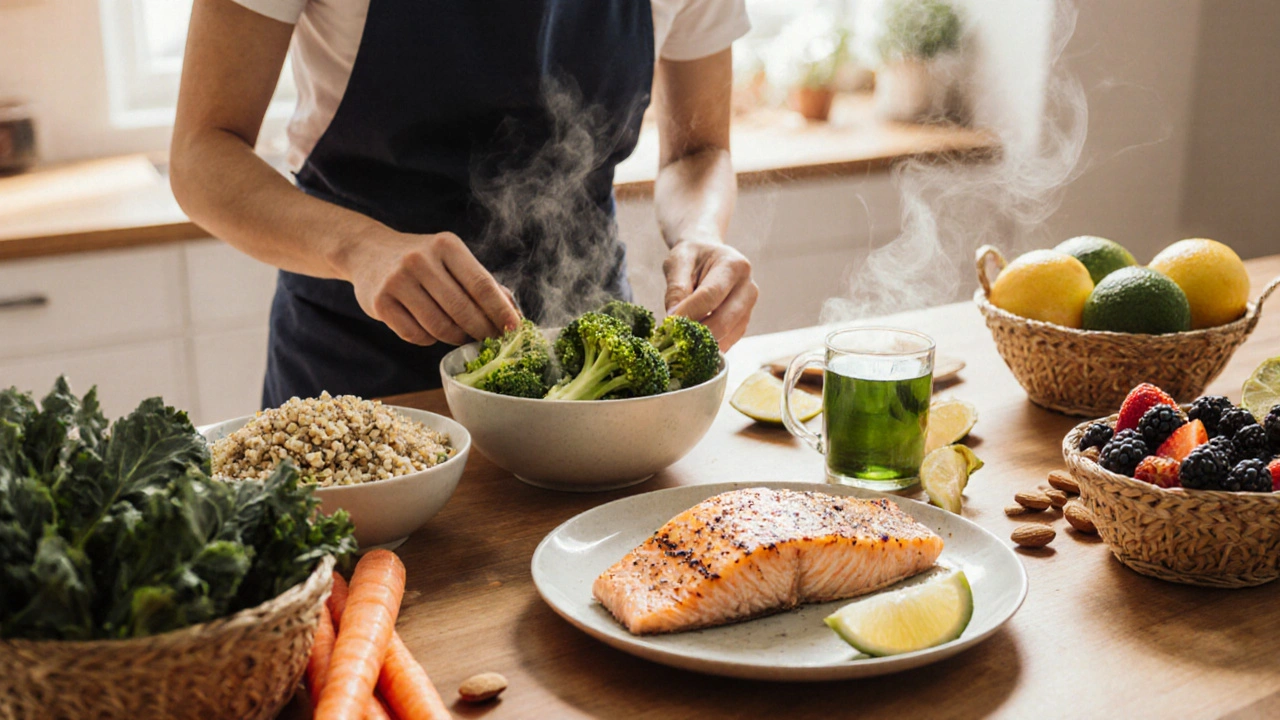


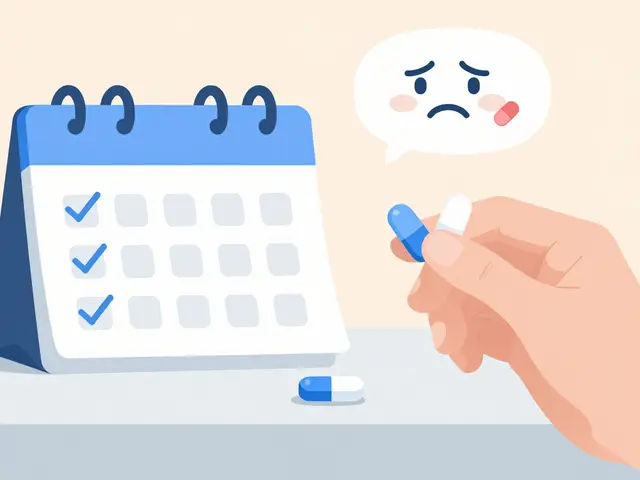
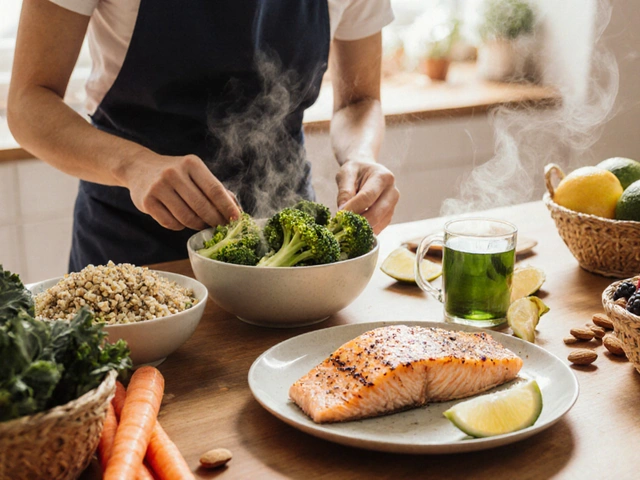
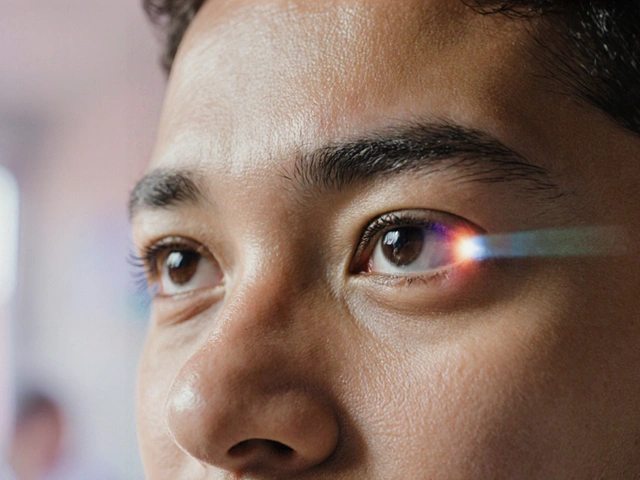

Reading through the diet guide, I feel a wave of empathy for anyone wrestling with liver cancer and trying to sort out what to eat. The advice to keep protein between 1.2–1.5 g per kilogram is solid, yet the reality of treatment side‑effects can make that range feel like a moving target. It’s helpful that the calculator is there, but remember to check your labs first – they’ll tell you if your liver can actually handle the extra nitrogen. Also, don’t forget that small, colorful meals can lift the spirit while delivering nutrients. Balance is key, and a dash of optimism never hurts.
While many celebrate the notion of a “liver‑cancer‑friendly” diet, one must ask whether such blanket recommendations truly reflect the nuanced metabolic demands of each patient. The article, for instance, touts a protein intake of 1.2–1.5 g per kilogram without acknowledging that aggressive chemo can catabolize muscle at rates far beyond what any static formula can capture. Moreover, the emphasis on “best foods” glosses over the fact that nutrient absorption is frequently compromised by treatment‑induced gastrointestinal toxicity. It would be naïve to assume a universal list of “good” fruits and vegetables applies equally to someone battling hepatic metastases and someone in remission. In many clinical trials, patients on high‑protein regimens actually experienced heightened nitrogen waste, exacerbating hepatic encephalopathy. The calculator presented lacks a critical variable: the patient’s current bilirubin level, which can dramatically alter protein tolerance. Also, the suggestion to avoid “all fats” ignores the emerging evidence that omega‑3 fatty acids can modulate inflammation and possibly improve chemo response. By painting all saturated fats as villains, the guide inadvertently steers patients away from short‑chain fatty acids that are vital for gut barrier integrity. The omission of micronutrient timing-such as spacing vitamin C away from iron‑rich meals-further undercuts its practical value. Let’s not forget that dietary adherence is heavily influenced by cultural food preferences, a factor the article barely touches. For a patient from the Indian subcontinent, recommending “lean poultry” without providing affordable alternatives can be both unrealistic and dismissive. One could argue that the tool would be better served as a decision‑support interface that dynamically updates based on lab results rather than a static calculator. The authors also neglect to discuss the role of personalized nutrition counseling, which many oncology centers now integrate into their standard of care. In short, while the guide attempts to be helpful, its one‑size‑fits‑all stance borders on oversimplification. A more responsible approach would acknowledge uncertainty, encourage professional dietary consultation, and continuously refine recommendations as new evidence emerges.
Let’s cut through the sugar‑coated hype: this “diet guide” is a slapdash collage of half‑baked ideas masquerading as medical advice. First off, the protein calculator pretends a simple weight‑based formula can outsmart the chaotic catabolism unleashed by high‑dose chemo – a fantasy that would make a quack smile. Secondly, the blanket ban on “certain foods” ignores the fact that many patients tolerate, and even thrive on, nutrient‑dense items that the guide deems forbidden because someone skimmed a single study. The tone is patronizing, assuming every reader has the same metabolic baseline, when in fact hepatic function can swing wildly from day to day. The article also fails to mention the peril of excess nitrogen load, which can trigger hepatic encephalopathy and derail treatment altogether. Moreover, the suggested avoidance of “all fats” betrays a lack of understanding of the nuanced role omega‑3s play in dampening inflammation and possibly enhancing chemotherapy efficacy. By ignoring the importance of individualized micronutrient timing, the guide leaves patients to guess when to take vitamin C, iron, or calcium – a recipe for suboptimal absorption. The absence of culturally sensitive alternatives reeks of Western‑centric bias; not everyone has access to kale or quinoa, and the guide never even nods to local staples that could be adapted safely. The calculator also omits critical lab markers like bilirubin, albumin, and INR, which are the real gatekeepers of protein tolerance. In short, this is not a robust, evidence‑based resource but a generic checklist that could do more harm than good if followed blindly. Patients deserve a dynamic, clinician‑guided plan, not a static web widget that pretends to replace professional nutrition counseling. Until the authors incorporate real‑world data, patient heterogeneity, and a realistic appraisal of treatment‑induced metabolic shifts, this guide remains an over‑promised, under‑delivered piece of content.
Thsi guide iz suuper helpful!! I lk seeing a calculatr, it makes me feel more control. Keep goin, you r doing great.
Hey there, just wanted to add a quick tip: if you’re tracking protein, try logging it in a simple notebook or a phone app. It’s easy to stay on top of the 1.2‑1.5 g/kg goal and see patterns over time. Also, remember to hydrate well – water helps your liver process nutrients better. Stay safe and reach out to a dietitian if you can; they’ll personalize the plan for you.
Useful tool, concise and clear.
Energy to everyone fighting this! The protein calculator is a great start, but think of your diet as a philosophy – balance the macronutrients, honor your body’s signals, and don’t forget the joy of a good meal. Even a simple broth can be a source of comfort and nutrients. Keep moving, keep eating mindfully, and trust the process.
Great guide 😊👍 love the simple layout and the calculator 🖩🍎 keep it up!
Ah, wonderful – another glorified spreadsheet telling patients what they “should” eat. How delightfully reassuring that we can reduce a complex disease to a few numbers, while ignoring the chaos of individual metabolism. One might even commend the effort for its sheer optimism, if only it weren’t so naïvely optimistic.
Interesting mix of formal advice and casual tone – I appreciate the attempt to bridge scientific rigor with everyday language. Still, the duality feels a bit strained; some sections read like a peer‑review article, others like a chatty blog. Perhaps a more consistent voice would help readers navigate the content without switching mental gears.
Look, this is just another piece of junk diet hype. No real science, just jargon to sound legit. Skip it.
Keep pushing forward, you got this!
Hey folks, just wanted to say that while the guide is decent, it misses the mark on cultural food diversity – not everyone can find kale or quinoa easily. Also, the protein calculator is handy but don’t forget to check your labs, especially if you’re on chemo; you don’t want to overload your liver. It’d be cool if future updates added more regional recipes and tips for staying hydrated during treatment. Stay strong and keep supporting each other!
From a clinical perspective, the recommended protein range aligns with current guidelines for patients undergoing treatment. Just be aware that individual tolerance can vary, so regular blood work (especially liver function tests) is essential to adjust intake. Adding a source of branched‑chain amino acids may help preserve muscle mass. If you have access to a dietitian, they can tailor the plan to your specific needs and any comorbidities.
Another useless guide, nothing new.